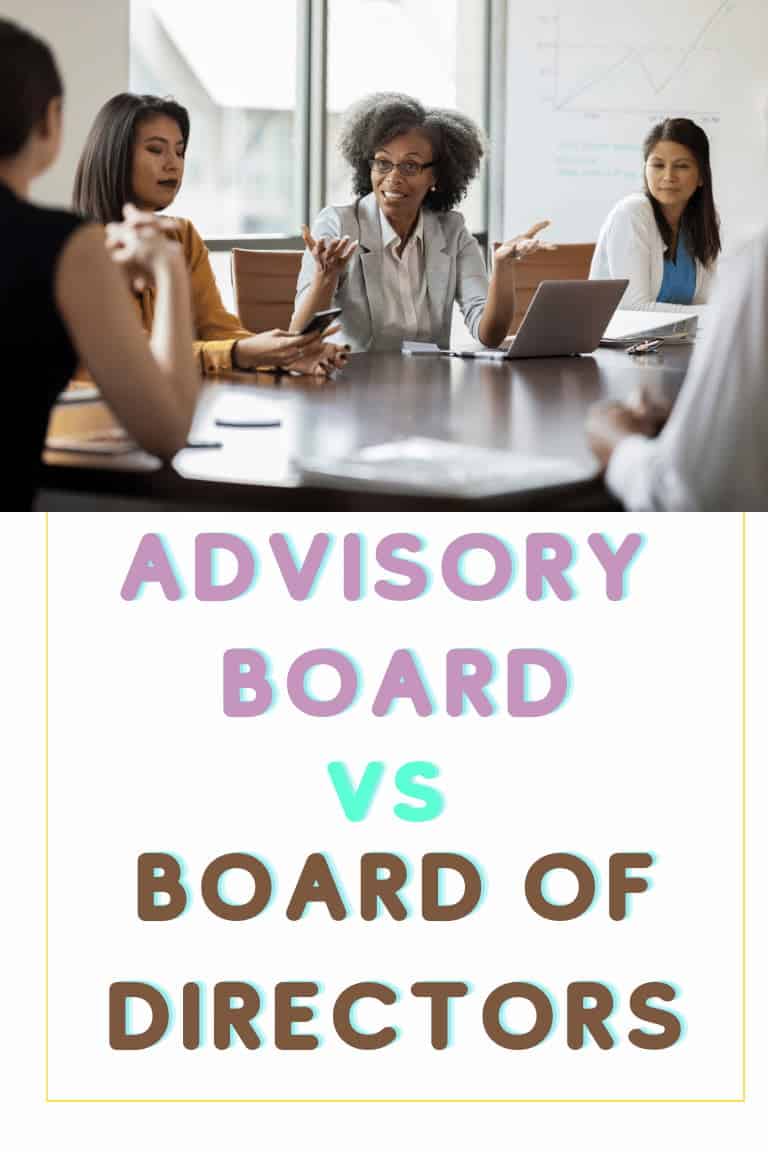After reading, Advisory Board vs Board of Directors, you’ll be well-versed in understanding how your business or nonprofit can benefit from an advisory board.
You will learn how it differs from a board of directors. Lastly, you will learn how to leverage the use of an advisory board in any business.
You will also learn more about the following, no matter what your business structure is:
- Advisory Board Member(s)
- Advisory Board Compensation
- Education Advisory Board
- Youth Advisory Board
- A List of Advisory Board Members You Should Have on Your Board
So, what is the difference between an advisory board and a board of directors? The short answer is that an advisory board differs from a board of directors in terms of fiduciary responsibilities.
That is a big word, I know. Let me explain. Fiduciary responsibility means that someone has a duty and must act in a way that benefits the beneficiary financially.
Therefore, a board of directors has a legal responsibility to an organization, corporation, or foundation, and an advisory board has non-binding responsibilities to said businesses.
So, what’s the point? Why would I want to use them?
Depending on your business structure, you are legally required to use a board of directors, while using an advisory board is optional.
Opting to have an advisory board can help fill gaps in knowledge and expertise that your board of directors and/or the CEO may not have.
Let’s get a good understanding of each.
Advisory Board vs Board of Directors
What Is An Advisory Board?
An advisory board is made up of advisory board members. The purpose of this type of board is to provide strategic advice to the board of directors and/or CEO.
The advisory board members are appointed to this group. They share their knowledge and experience and provide strategies for said business or organization.
Advisory Board Member(s)
I love how Wikipedia describes the function of advisory board members.
“The function of…advisory board [members] is to offer assistance to enterprises with anything from marketing to managing human resources to influencing the direction of regulators. Advisory boards are composed of accomplished experts offering innovative advice and dynamic perspectives.”
For example, if your nonprofit, business, or foundation was looking to open in a new market, the CEO or board might consider an advisory board member who has experience with market expansion.

Compensation
Nonprofit advisory board members almost always serve without direct compensation. A small business advisory board is unlikely to be compensated in the same way.
In contrast, advisory board members of corporations may be paid between a third and half of what regular board members are paid.
Corporate advisory boards may also be compensated with stock options in the company.
Let’s continue to explore the differences between an advisory board vs board of directors.
Education Advisory Board
This will be particularly interesting for my teacher friends starting their own micro-schools. If it is for profit, then you absolutely have to read this.
Take advantage of an advisory board if you own a small business, such as a micro-school, or if you’re an entrepreneur who wants to keep control of your company.
These businesses are not nonprofits and thus are not required to have a board of directors. But there is nothing stopping them from creating an advisory board.
An advisory board would make sense for so many reasons. It’s important to understand that any company can form an advisory board- for-profit or nonprofit.
Advisory boards are a suitable solution for small business owners who need access to high-quality advice, non-biased information, and recommendations.
The main reason for forming an advisory board is to seek outside expertise that you can’t afford or don’t have yourself.
Your advisory board members should bring knowledge, understanding, and strategic thinking to your business industry or management.
Now, does it make sense as to why you would want to have an advisory board? It’s a no-brainer.
Not only that, you might be interested in starting a youth advisory board.
Youth Advisory Board
A youth advisory board is simply an advisory board comprised of youth.
These boards are a common strategy used to engage youth, give them a voice, and/or provide an opportunity to help them gain leadership skills.
If you are an educational business, then why wouldn’t you want to have access to a group of students to get feedback?
Before I give you examples of the types of people you would want to approach for your advisory board, I really want you to make sure you understand the purpose of the board of directors.
What is a Board of Directors?
The Board of Directors is legally obligated (fiduciary) to govern the organization, and their decisions are binding on the company or organization.
In practice, the Board of Directors is responsible for determining the company’s strategic direction.
It is also responsible for putting that strategy into action by hiring employees, setting a budget, and completing projects.
We’ve talked about the nature of advice from an advisory board vs a board of directors. Although they both give advice, one is obligated to do so for the betterment of the business.
We’ve also talked about the differences in advisory board compensation. The last difference that you should know about is voting rights.
A board of directors has voting rights and the authority to make organizational changes. They can even fire the CEO or change the executive management team.
Members of the advisory board, on the other hand, do not have voting rights. It is entirely up to the CEO or executive team to follow the advice of their advisory board.
In a nutshell, there you have it! However, what I hope you are wondering now is: “Who should you invite to be a part of your advisory board?”
Now for the record, if you are looking for a rock-star list of people for your board of directors, I would say they are a combination of the same types of people.
I did a video below with over 15 types of people with specific skill sets that you might want to pursue to be on your boards.
Reaching Out To Get Your Advisors On Board
Now you should know exactly who you potentially want on your advisory board.
It’s time to reach out to them and make the BIG ask.
Although I call this the BIG ask, it’s not what you think. Don’t ask them for their skill set or money just yet.
You want to invite them to a meeting to learn more about your school or small business and how they can be on your board of advisors.
There are several ways to do this. Just select the way that is more comfortable for you or more appropriate for the way you may or may not know the person.
Send an email, make a phone call, or invite them to lunch.
Before doing so, you will want to create a one-pager.
Describe your mission and the need for your school. Don’t forget a short introduction to yourself. Make it compelling.
You want to make it as short as possible. People don’t like to read anymore.
Do make it long enough, however, to explain this awesome endeavor you are embarking on that will benefit the community.
Please DO NOT overload them with all the information from step two.
Just give enough to get to an in-person or Zoom meeting where you will go into more detail about your school and your vision for it.
It will be at this meeting that you will talk more about why they are needed and invite them to use their skills and wisdom to help you complete the process of building your school.
If they are interested, be sure that you get a commitment of time, financial support, or their skills donated to your organization.
If you are a non-profit or going to become one, their donation(s) of time and money may become a write-off for them.
In Conclusion
Now that you know the difference between an advisory board vs board of directors, do you think having an advisory board for your business or nonprofit makes sense?
If so, who are the experts that you will ask to be on your advisory board that will round out your expertise?

Hello Cindy,
Yesterday I came across your videos on YouTube and I’ve spent the morning exploring everything I can find! Thank you so much for sharing your experience, knowledge and passion!
I would love to have my own micro-school someday (praying it’s soon!) but right now I am very blessed to be a part of a start up organization in Minnesota called Portals Academy. Our vision is to support parents, teachers and churches in providing affordable, quality, Christ-centered education to students K-12 who are currently suffering in government schools and need alternative options.
Would you allow us to include you as resource for our partners interested in starting their own schools?
Thank you and God bless your work!
For sure!!!
I have not gotten very far into your material yet, but I’m wondering what state you are in and whether you’ve looked into the requirements of Dodgeville states or where to even go to find the requirements of Washington state.
I am in GA. There is a link to the requirements of states in the Wrap-up section of step 4 here: https://theldcoach.com/how-to-start-a-school/